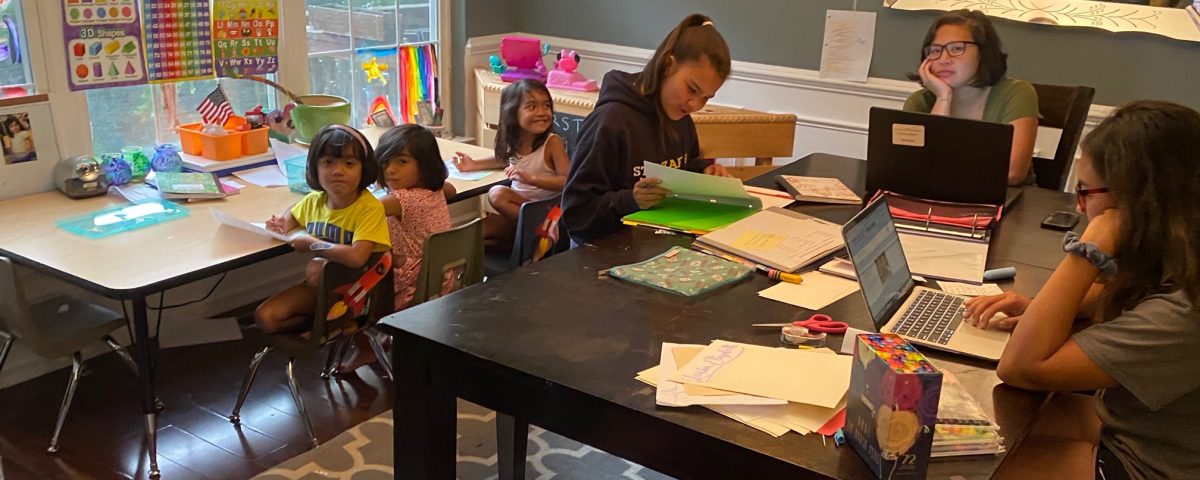
By Michelle Legaspi Sánchez, Executive Director of CCFWG
Back-to-school shopping lists and “First Day of School” photos look a bit unusual these days. Face masks and Chromebooks never made the list before, and never have I seen as many children starting their academic year in sweatpants.
I totally get it. As a mother of five (a rising high schooler, a rising middle schooler, and three rising kindergartners), I am in the throes of this alternative reality we never could have imagined. My “third shift” job has been preparing for the start of this school year and worrying about how to ensure my girls will have their academic needs met, connect with their classmates as they start in new school communities, and remain healthy. All parents are wrestling with these difficult questions in some form or another.
As complicated as my family’s schedule and contingency plans look right now (believe me… I have plans for my plans), I am privileged with a job that gives me a fair amount of flexibility over my schedule and a spouse who contributes to our parenting responsibilities. As worried and fatigued as I am, I know that most working moms are not as fortunate. Too many do not have paid leave when they or their children are sick, do not have the option of working remotely, or cannot afford the childcare they need to actually go to work.
Just a few weeks ago, the organization I lead, the Chester County Fund for Women and Girls (CCFWG), hosted the virtual event “Overlooked and Undercounted: Struggling to Make Ends Meet in PA” with our partner, PathWays PA. The event explored the Self-Sufficiency Standard for Pennsylvania, a report that details the real cost of getting by. According to the Standard, a single parent with two children living in Chester County needs to make over $80,000 annually to be self-sufficient, a figure higher than any other county in southeastern Pennsylvania. Additionally, according to CCFWG’s latest Blueprint Report — which looks at how women and girls are faring at the local, state and national levels — child care costs in Pennsylvania exceed 40% of the median annual income of single mothers. These startling figures were the reality faced by many women, particularly women of color, in Chester County prior to COVID-19. Now, in the midst of a global pandemic, when the family juggling act has intensified and the ability to provide the most basic needs is even more at risk, the crises faced by working mothers cannot be ignored.
As we see how a novel virus is infecting our lives and society, it’s clear that many of these issues being brought to the fore — like the cost of childcare, the tenuous juggling act of the working mom, gender-based violence, racial justice, and access to healthcare — are the same community needs that brought CCFWG and other non-profit organizations into existence. The truth is, there was already an infection. It’s now just inflamed.
We are at a watershed moment, a chance to not only address the inflammation but to strive for healing and change of systems that have consistently put women at a disadvantage. How can we seize this moment? I challenge those with formal power and influence, such as our elected officials, employers, community leaders, and foundations, to reimagine what has been status quo. What are the policies and supports that you can enact to prevent us from ever returning to this condition? Now is the time to consider policies that have been sidelined for too long — paid leave, flexible work schedules, childcare funding, and increased minimum wage.
And, to my fellow mothers (including and especially those with the aforementioned formal power and influence) who are striving to do right by their kids, tell your story. You don’t have to be the elusive “Supermom” who is doing it all in heels and with a smile on her face. Just like we tell our kids to speak up when something is not right, we need to do the same. We must use our voice to demand a more equitable, sustainable balance. Talk honestly about the struggles you are facing with your boss and/or coworkers. Don’t be afraid to seek support from those around you or local organizations that can help. Bring up the idea of balance and self-care with your partner, kids, and those in your circle. Connect with other moms or parents on social media. Make it a part of your everyday conversation. Together, we can find solutions and leverage our strengths to enact them in this time of crisis and beyond.
